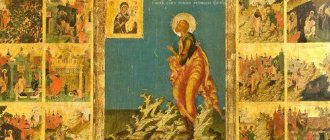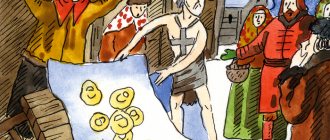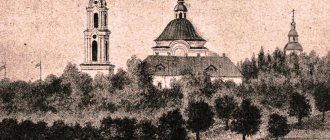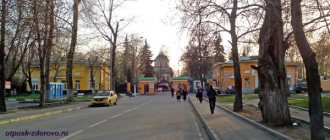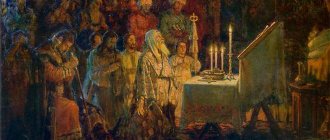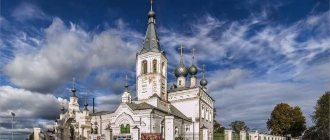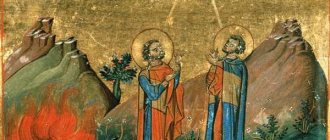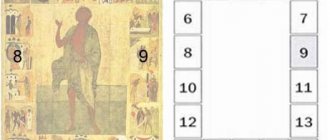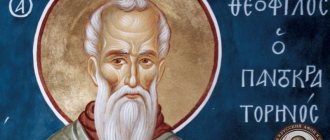The memory of Blessed Maxim of Moscow, Christ for the Fool's sake , is honored by the Church on November 24 (November 11, old style), as well as on August 26 (August 13, old style), on the day of the discovery of the relics. Blessed Maxim chose a rare path of salvation - foolishness. The hidden path, which not many can do, and these are God’s special chosen ones. Saint Maxim was revered in Ancient Rus' on a par with blessed Procopius of Ustyug and Vasily of Moscow. This equality can be traced in singing sources, for example, in Obikhoda, in the refrains (magnification) according to polyeleos, it is written: “Procopius of Ustyug. And for Christ’s sake to the holy fools Vasily and Maxim.”
Everyday life, ed. Preobrazhensky almshouse in Moscow, 1911, sheet 106 vol. – 107.
Life of Blessed Maxim of Moscow
The feat of voluntary foolishness, for Christ's sake, was especially widespread in Rus'. These blessed holy people did not go into the desert to pray for the whole world, but on the contrary, they came to cities, lived among people and suffered a lot from them, but they were with their people and bore all the hardships of their life. The Lord usually revealed fools to the world in difficult times for the people. The blessed loved people so much that they could not leave them in difficult times; they were there, but in their humility they hid their holiness under the guise of madness for this world. The holy fools spoke figuratively, secretly, sometimes in the folk language of proverbs, but their words reached the very heart of a person. They endured even greater suffering than ordinary people, and the people appreciated their humility, were ready to hear them and listen to them - from the poorest commoner to the king. Rus' loved its holy fools, and they loved their people. So Blessed Maxim did not go to escape into the desert or a monastery, but lived on the streets of crowded and noisy Moscow of the 15th century, during difficult times for the Russian people - raids of the Horde, drought, epidemics. Nothing is known about his parents, time and place of birth.
At any time of the year, Maxim walked almost naked, did not have his own shelter, wandered the streets, most often lived in the open air in the heat and cold, ate only the meager food that people served him, he had no family and was humanly alone . This is difficult for a modern person to understand: why should a person, living in those difficult historical conditions for the country, voluntarily burden himself with even greater need? Enduring all the hardships, Saint Maxim did not give up prayer to the Lord - thereby he was strengthened and saved. God works in mysterious ways. A person is, first of all, his soul, thoughts, aspirations. Blessed Maxim voluntarily renounced all the blessings of this world and even his mind, for the sake of saving his soul and his neighbor, for the sake of union with Christ in earthly and eternal life. This is Love. Love for Christ and for people. His whole life was an exposure of corruption, emptiness and madness of the world. Saint Maxim supported and consoled many people with his words, and denounced some for admonition.
He endured insults, ridicule and contempt from people, hid his wisdom with external madness, thereby cleansing his soul and heart from pride, desire for glory and fear in order to meet God, he learned to love people and hate sin. First of all, he cleansed his soul from sin, but also did not leave his neighbors to perish in sin. Saint Maxim was not afraid to speak the truth to everyone in need of admonition and reproof, even to the powerful of this world, thereby showing love and indifference to man. For the edification of his neighbors, he often appeared in crowded meetings and at market places, did not hesitate to enter vicious societies and, under the cover of foolishness, denounced wickedness and led the most brutal sinners to the path of repentance.
He tried to do all his good deeds secretly, even his reproofs and instructions were in a hidden form, incomprehensible at first glance, but soon the person understood what the saint was telling him. Blessed Maxim saw the hearts of people and tried to warn them from committing sin. Sometimes he denounced people explicitly, but under a strict ban on keeping what he heard secret. If Saint Maxim noticed that people began to revere and praise him, then he tried to destroy these opinions of people with strange or indecent actions, imaginary participation in unvirtuous actions, and sometimes violation of church traditions and rules.
The holy fool’s denunciations did not remain fruitless; many Muscovites turned their hearts to God. His sayings are interesting:
“Although the winter is fierce, yet sweet is paradise,” said Blessed Maxim, running naked through the streets of Moscow, teaching everyone patience and enduring everyday hardships.
“Let us endure and we will be people; for patience God will give salvation.”
“Not everyone is like wool, and vice versa. The lascivious pig has a log around his neck. They will beat you for the cause, obey and bow lower. Don’t cry, you’re beaten, cry, you’re not beaten.”
“Little by little, damp wood catches fire.”
To those suffering from hypocrisy and pharisaical piety he said:
“Everyone is baptized, but not everyone prays.”
“The goddess is homely, but the conscience is corrupt.”
“By beard is Abraham, but by deeds is Ham.”
“God will find out every untruth. Neither He nor you will deceive Him.”
Orthodox texts
The role of the Russian ascetic in Orthodoxy is evidenced by prayers glorifying his feat in the name of Christ.
Troparion
With a naked body and patience / you opened the enemies of deception, / exposing his shameful act, / the sun is evil in the sun / and the needy big jelly, / you did not have dirt and fire, / cover with the help of God, / Maxim the Wise, / with faith in that that you create your memory honestly / and diligently flow into your strength / pray to get rid of troubles / and not fall.
Troparion
With your patience you have acquired a great gift in Heaven / in confusion according to the will of Christ, which will be offered / and in the mental heavens, as in a chariot of fire, / you will ascend, the highest wisdom. / Today we honor your honorable relics, having found / together with the pious and faithful people of the ruling city of Moscow, / yes, they all cry to you: / pray to God God / save our souls
Canon
Song 1
Irmos: I blacken the sea with the fearless feet of the ancients, I walk through Israel with the cruciform hand of Moses, the power of Amalek in the desert has triumphed.
He received communion from God, reverend, there was light, and, having entered to Him, Maxim is blessed, with the greatest desire, blessed are our hopes, moreover, the fulfillment of God's grace.
With God's desire I burned, the world has left you, comrade, Father, I will earn, Christ, Maxim gloriously, You have not crossed the path of salvation, rejoicing.
In order to be enriched by those who are not deprived of thirst, wealth and temporary glory, the wise and I eat the transitory and earthly goods that you have graciously renounced.
Born of God: the red, chosen and most just mind of Ty, the Son of God, the Immaculate, the Son of your being, the children created grace, the Lord who honors Ty.
Song 3
Irmos: Your Church rejoices in You, Christ, calling: You are my strength, Lord, refuge and confirmation.
Strictly thoughts of coping with the action, defeating the enemies of the regiment with the divine concession of the Spirit.
Wounds, abstinence from prayers and blows, reverend, worldly passions, Father Maxim, you bitten.
Killing the enemy Your apostles, Jesus, the joy of slaying, Lord, you want to sacrifice life.
Divine: Having freed people from disobedience, the last fall, all guilt, pure and unblemished, gave birth to You.
Sedalen, voice 8
Illumined by divine light, along the path leading to divine radiance, he truly walked, more reverend, and fled from the enemy, and the son of light and day appeared divine, Max.
Gloria: God the Father and beloved Maximus, the red color of this world, since they know how to count, changed the weight, the mind that changed out of love for Christ was satisfied and justly calculated. And now, as you pray for us, your remembrance of those who faithfully glorify is very commendable.
Theotokos: Representative of the faithful, Mother of God, weeping with joy and crying out for great consolation, from Thy womb, O Virgin, all the Holy Ones born.
Song 4
Irmos: Having risen from your gaze, the Church on the Cross, the righteous Sun, standing in its rank, worthily exclaims: Glory to Your power, Lord.
Having entered the path of righteousness, you have entered the Divine City, saved by God, reverend, enriched with salvation.
Homogeneous, reverend, divine vision, meaning that you have been clothed in divine stories and divine garments.
I will purify your heart, I will purify the Holy Spirit by receiving it, Father, I wrote perfect indifference and love that is not hypocritical.
Goddess: Sit on the throne raised by the cherubim, as the throne that is yours is on your hand, Mary, God of God, the highest glorified God.
Song 5
Irmos: You, Lord, my Light, have come into the world, Holy Light, convert with faith those who glorify Ty from dark ignorance.
Blessed dawn, Maxim, accept it as the sun, you appeared, and the darkness of the demon drove you out, glorious.
At your will, Christ, he has renounced every honorable desire of the body, as you shake off the grave of the world.
Having strengthened the power of the divine soul, you settled in the world, exhausting passions, Father God damned Maxim.
Theotokos: Repentance of the past, the Virgin incorruptible by the birth of God, the Word, greater than nature and words, the Virgin remains.
Song 6
Irmos: Consume You with the voice of praise, Lord, the Church calls to You, freed from demonic blood, for the sake of mercy, blood flowed from your ribs.
Wow, your burden is before God, who strives for incessant teachings, you did not spare carnal love, he blessed you with your sacrifice, Maxim, appropriation.
You have received no harm or harm, blessed one, I live among you.
You, who have carnal wisdom above, who have meaning, did not touch you, we were born among women.
God of God: With our lips, and with our minds, and with our hearts, Most Holy Theotokos, we preach: To you, O God, we will be reconciled, rejected by iniquity before our father.
Kontakion, voice 2
Desiring the highest beauty, the lowest sweetness and bodily clothing, I did not blame you for anything and loved more the non-greed of the world. Passing through the life of angels, you are dead, blessed to Maxim: from the lower Christ, unceasing prayers for us all.
Ikos
The angel appeared on earth with his life, surprised the angelic regiments and terrified the demons, and illuminated your miracles with charges, enjoying and prevailing over our Maxis. And now teach us to sing a song of your praise with a joyful voice in the voice of those applauding: Rejoice, corruptible wisdom remaining and receiving an imperishable crown; Rejoice, patient soul; Rejoice, in your mind and before God; Rejoice, predisposition to foolishness, destroy the evil enemy under your feet; Rejoice, lower wisdom of peace and higher kingdom of exploits; Rejoice, healer of ailments and averting passions; Rejoice, blessed Maxim, pray unceasingly for all of us.
Song 7
Irmos: In the cave of Abramostia, the great Persians, their love for mercy greater than fire, are burning, exclaiming: Blessed are You in the temple of Your glory, Lord.
We have in us the likeness of Christ, the father, divine love, others, to be saved with joy, we are happy, weep, we radiate: blessed be God our father.
From heaven is what was given to you, father, I will take food, I have given me a gift from you, which graciously welcomes your commands and draws into sin those who leave, the more blessed.
Having made the paternal tradition happy, Father Wise, the lips reject the commandments, calling: Blessed is God our father.
Our Lady: Most High divine consecrated settlement, rejoice, joy will be given to you, Mother of God, calling: blessed are you among women, Immaculate Master.
Song 8
Irmos: Rutse lay, Daniel, a lion wide open in the furrow of his cloak; But the power of the fire was extinguished, virtue was surrounded, the mercy of the workers, the fathers, exclaimed: Bless all the works of the Lord, the Lord.
The bright star dwells in darkness and passion, a bright conductor of the life of lights: she creates an unclean life for her wife and drives away all evil, crying out: bless all the works of the Lord.
You have healed my mind with the blood of the wonderful and wise, Reverend, the commandments of God, many have caught the righteousness of the Lord the Lord, knowing that we are blessed to be, the cry of the Lord is pure.
Perfect is he who glorifies the same, Lord, Reverend. Behold, let us send to the grave and honor the angels with enlightening words who cry: bless all the works of the Lord, the Lord.
God of God: Save us, exaltation from You, Lord, Most Holy Virgin, pray to Him, Master, to enlighten those who sing Tai, and save us circumstances, crying: bless the Lord, all the works of the Lord.
Song 9
Irmos: The stone is not cut by hand from a rough mountain, to Te, Devo, the cornerstone of the cut - Christ, the spatial junction of nature. Therefore, Rejoice, Tai, Mother of God, we expand.
With all my heart Maximus, the Trinity, being sincerely offered and from Neia, received a divine welcome, the light was seen by an angel and angels.
By divine desire, united and enlightened by abstinence, future blessings in fellowship have already been fulfilled, Maxim is blessed by God and in joy.
Your illnesses and sweat will bring joy that has no end, but do not eat enough, Rev. Maxim, remember us constantly.
Born of God: Destroy my souls, my clouds, Light of the cloud, Holy Lady, and make me powerful for the passion that fights against me, Savior of all born and Redeemer.
Miracles and veneration of Blessed Maxim of Moscow
After hard and many years of ascetic labors, Blessed Maxim reposed on November 11, 1434. He was buried near the church of the holy princes Boris and Gleb. After some time, numerous healings began to take place at the saint’s grave. Thus, on April 23, 1506, at the burial site of St. Maxim the Fool for Christ, God healed a man “who had a crippled leg.”
As a result of numerous miracles from the saint’s tomb, in 1547 the Council determined: “To sing and celebrate in Moscow on the 13th day of August the new Wonderworker Maxim, for Christ’s sake the Holy Fool.” In the “Charter of Church Rituals Performed in the Moscow Assumption Cathedral” (circa 1634), under November 11 it is said: “To Maxim the Fool for Fool: good news to the swan, the middle one”; under August 12/13: “First of all, we celebrated Blessed Maxim: the bell of the swan, the ringing of the middle; but now they only celebrate in November, and sing according to the rules.”
On the ancient linen cover placed on the shrine of the holy relics, around the image of the Pleasant of God there is the following inscription, signifying the time of his repose and the opening of his holy relics: “6942 November 11th day, Saint Maximus of Christ, the Fool for Christ, the Wonderworker of Moscow and all Russia, reposed in the reigning city of Moscow during the reign of the Blessed Grand Duke Vasily Vasilvich. His honest body was buried in China-Grad, on the Barbarian sacrum, near the Church of the Holy Passion-Bearers, Princes of Russia, both brothers in the flesh of Boris and Gleb. Through the diligence of the pious husband Theodore Vokhchin, some years after the repose of the Holy Blessed Maxim, a church, small and without connections, was quickly created over his holy relics in the name of his namesake, the Venerable Maxim the Confessor. And the relics of St. Blessed Maxim, although they were found, lay under a stone tomb, and not in reality. All-merciful God, glorified in the Trinity, put in the heart of reverence the husband, the Moscow resident of the Gostinnaya Hundred, Maxim Filippov, son of Verkhovitin, that both holy churches, the present and the chapel (Boriso-Gleb) would be dismantled and a new one created. To this - (he was assisted) - and another named Maxim Vasiliev IIIarovnikov, a resident of the former city of Kostroma. In the year 7206 (1698), April 14, under the power of the Sovereign Tsar and Grand Duke Peter Alekseevich of All Russia, the Autocrat, with the blessing of His Holiness Adrian, Patriarch of Moscow and All Russia, after the funeral of the usual prayer singing, began to dismantle the dilapidated stone building and in In that place, where the relics of St. Blessed Maximus, by the grace of God, a stone fell away from the wall, and apparently there was a great treasure for everyone, the multi-healing relics of St. Blessed Maximus. On the 13th day of May, at the command of His Holiness Adrian the Patriarch, a solemn singing was performed for the Holy Blessed Maxim, and after the all-night singing, His Grace Tikhon, Metropolitan of Sara and Podonsk with the Archimandrites and Igumnas, with the Priests and Deacons, dressed in sacred clothes, stood around the tomb and began disassemble the stone, and then a wondrous miracle happened: again, much stone fell apart, the hedgehog over the tomb of the saint, and through the prayers of Blessed Maxim, harmed no one, and about this miracle glorified God and His Saint, Blessed Maxim; and he lifted the ark with holy relics onto his shoulder with holy crosses and icons, and the Deacons with censers and candles; Then a great multitude of people flocked to see and bowed down to his relics, glorifying God and His Pleasant.”
Here it is necessary to explain that the temple in honor of the noble princes Boris and Gleb, next to which Saint Maxim was buried, burned down in 1568. But Maxim’s holy relics remained hidden. Reverent admirers of the saint's memory built a chapel over his grave in honor of Saint Maximus the Confessor.
In 1698, thanks to Moscow residents Maxim Verkhovitinov and Maxim Sharovnikov, the old Boris and Gleb Church was dismantled, and during the work, a stone fell off the wall and the holy relics of Blessed Maxim were discovered. They were honorably transferred to one of the Moscow cathedrals, where they remained throughout the construction of the new temple. According to legend, during the construction of a new church in honor of St. Maxim, his relics were kept in the Chudov Monastery or in one of the Kremlin cathedrals. This legend arose from the existing interesting painting of the temple; the discovery of the relics is depicted on the wall icon of St. Maxim, as well as on the icon located on the external northern side and on the western wall inside the temple, in transferring them with a procession through the Spassky Gate to the Kremlin. The newly built church, which now exists in its original form, was consecrated in honor of the Holy Blessed Maxim of Moscow with a chapel in the name of the Venerable Maxim the Confessor. The relics of Blessed Maxim, kept incorrupt for up to three hundred years, remained open for only 39 years - from 1698 to 1737. In 1737, or more precisely on May 29, during the great Trinity Fire, from which a significant part of all of Moscow burned, “the Maximov Church burned out completely, and the shrine from the entrance to the Wonderworker Maxim burned down, exactly in the place where the shrine with the holy relics stood, on a stone platform, the relics of the holy bones remained, which the priest Jacob Grigoriev, with the deacon and clergyman, collected in a box, locked them, and placed them in the altar. According to the determination made by the Synodal Chancellery on the 6th day of June of the same year, 1737, these holy relics, then sitting in the Synodal Chancellery, His Eminence Veniamin, Bishop of Kolomna and the Archimandrites, were examined and described, and upon inspection, in a deliberately made box, those relics of His Eminence were placed with their hands, and after being closed and sealed with the synodal seal, they were given to the synodal sacristan for storage” (Decree of the Holy Synod of April 30, 1764). The burnt-out Maximovsky Church was renovated and consecrated on May 30, 1742, as stated in the inscription on the newly built iconostasis. And the final decision on the return of the remains of the relics of Blessed Maxim took place on January 21, 1768. In 1770, as recorded in the church inventory, “a new carved shrine was built for the relics of St. Maxim the Blessed, above it there is a canopy on eight carved pillars, and above the pillars there is a carved canopy. Everything described above is gilded with red gold.” In 1812, “the relics of Blessed Maximus remained in their place under a bushel, in their original form. The pulpit is raised, the altar in the warm church is overturned, the frames and logs in the windows are burnt out, the roof is also burnt out and all the church utensils are burnt out; except for the hidden most necessary things, everything was looted” (From the testimony of St. Ignatius Ivanov to Archbishop Augustine). In 1876, instead of a dilapidated wooden one, a new metal gilded shrine was built, into which, after its consecration, a cypress ark with the relics of Blessed Maxim, more than an arshin in length, up to three-quarters in width, was transferred with due honor.
The said priest Jacob Grigorievich donated an altarpiece silver gilded cross with particles of holy relics stored in it, and with the following inscription on it: “This holy and life-giving cross of the Lord was built with the care of the Maximovsky Church of Priest Jacob Grigoriev on November 5, 1717 in memory of the former terrible great fire this Mayan year on the 29th day of the week of Pentecost in commemoration of his mother Ksenia Fominichna and his father Thekla Yakovlevna and the children of his burned babies Elizabeth, Hierofia, Jacob who were burned that day.”
At one time, two cases of miraculous help from Saint Maximus were recorded; these cases were reported directly by those persons who were honored to receive it. Hereditary honorary citizen Ivan Alekseevich Smirnov repeatedly spoke with tears of tenderness about his miraculous healing from illness through the prayers of St. Maxim. This story can be found in a letter dated November 15, 1848, from Metropolitan Philaret of Moscow to the abbot of the Holy Trinity Sergius Lavra, Archimandrite Anthony: “The headman of the church in which the relics of Maxim the Blessed rest, working diligently on the restoration of this temple, fell ill with a sore throat that he was losing hope to survive, and at the thought that he would not see the consecration of the temple, he began to cry while lying in bed. At this time he sees before him Blessed Maximus, who places the sign of the cross on him and says: In the name of the Father and the Son and the Holy Spirit. The sick man said: Amen, he wanted to kiss the hand of the righteous one, but he ceased to be visible. Following this, an abscess in the throat opened, pus came out, and the elder, with increased zeal, celebrated the renovation of the temple, which took place on October 1, 1848.” (Letters from Metropolitan Philaret to Archimandrite Anthony).
And here is the second case of the help of Blessed Maxim: “In 1867, there was a Moscow merchant widow, a well-known supplier of clothing to the Highest Court, in the Maximov Church, who had her own house and workshop in it near the Kazan Church in Sushchev, Belkin (name not indicated), so that listen to the prayer singing to Blessed Maxim and told the clergy the following: A handsome old man appeared to her in a dream (the time is not indicated) and said to her: you are threatened with great misfortune; for deliverance from him, resort with prayer to Blessed Maxim the Moscow Wonderworker. She did not know in which church the relics of Blessed Maxim were located, and she arrived at the cathedral church of St. Basil. There she found out where the relics of Maxim the Blessed rest. Arriving at the Maximovsky Church, she asked the clergy to serve a prayer service for the Pleasant and fervently prayed to him for his intercession. The appointed day, on which, according to the prediction of the old man she had seen in a dream, misfortune would befall her, passed safely. Night has come; Everyone in her house was already asleep. She alone did not sleep in anticipation of misfortune. Around midnight there was a fire in her house. She immediately woke everyone up; sent a messenger to the Sushchevskaya unit with news of the fire. All property, on her orders, was pulled out of the house and stored. The fire brigade soon arrived and the fire was stopped as soon as it started. The loss from it was insignificant. So Blessed Maxim, whose holy body, which remained incorruptible for up to three hundred years, was not spared by God’s permission during the great Trinity fire, by his intercession before God delivered the designated servant of God from the fire” (From the church chronicle).
Which saints bore the name Maxim
Most of the saints named Maxim lived during the period of persecution of Christians. They showed incredible selflessness in defending the true faith, disregarding all torment and thereby setting an example of true fidelity to the teachings of Christ. Here are the names of these holy martyrs: Maximus of Adrianople, Maximus of Marcianopolis (Mosia), Maximus of Asia, Maximus of Antioch, Maximus of Africa.
Particularly noteworthy are two saints who made a huge contribution to the struggle for the purity of the teachings of Christ and its dissemination: Maximus the Confessor and Maximus the Greek. Both were canonized, and to this day the icon “Maxim the Confessor” and the icon “Maxim the Greek” are venerated by the Orthodox.
Troparion, kontakion and canon to Blessed Maxim of Moscow
Troparion, tone 5
By nakedness of body and patience, you have exposed the treachery of the enemy. By denouncing an inappropriate act, the green sufferers suffer from solar wars, and the necessary great cold. I don’t feel scum and fire, we cover ourselves with God’s help, Maxim the Wise. For those who faithfully honor your memory honestly, and diligently flow to the body of your relics, pray to get rid of troubles and avoid the fall.
Kontakion, tone 2
Desiring the highest beauty, the lower sweets, the bodily things, you counted for nothing, the non-acquisitiveness of the vanity world. The angelic life passed away, Blessed Maxima. Pray to Christ God with them, constantly for all of us.
Library of the Russian Faith Canon to Blessed Maxim, Fool for Christ's Sake, Moscow Wonderworker →
Read online
How does the icon of Maxim the Greek help?
St. Maximus the Greek sponsors scholars, theologians, translators, students and seminarians, as well as missionaries, catechists and apologists. If you touch on the meaning of the icon, then you turn to it to strengthen faith and spirit, especially during persecution for the faith and unjust oppression by the authorities. In addition, the icon “St. Maximus the Greek” can cure various diseases, as well as relieve despair and depression.
Whatever icon of Maxim is in your life, it will help you stand firmly in faith and resist temptations.
Days of remembrance of St. Maximus the Confessor - January 21, August 13
The days of memory of St. Maxim the Greek are January 21 / February 3 and June 21 / July 4.
Blessed Maxim of Moscow, Fool for Christ's sake. Icons
Blessed Maxim of Moscow. Menaea Augustus (fragment). Icon. Rus. Beginning of the 17th century Church-Archaeological Cabinet of the Moscow Theological Academy
St. Blzh. Vasily and Maxim Moskovsky (fragment). Icon case frame. Rus. Last quarter of the 16th century. From the Cathedral of the Intercession Monastery in Suzdal
“Bogolyubskaya” with selected saints (in the middle are the Moscow saints Peter, Photius, Macarius, blessed Maxim, John). Icon (three-leaf folding). Istoma Savin. Moscow. End of the 16th - beginning of the 17th century. Tretyakov Gallery
Barlaam the Hermit, Euphrosynus of Pskov, Maxim of Moscow. Detail of the “Heavenly Canopy” camp church. Tver Regional Art Gallery, 1588–1590.
St. Basil and Maxim the Blessed at the Moscow Kremlin. The mark of the icon is “Saturday of All Saints, with selected saints in the margins.” House-Museum of P. D. Korin, 1813
Iconography
The iconography of mad saints was influenced by Maximus's enterprise. The image of the blessed one resembled the images of the great ascetics of early Christianity. For icon painters, a type was established that they had to follow when creating a sacred image: a thin old man with sparse gray (bald) hair, a gray beard (in the image of St. Nicholas the Wonderworker), naked, wearing a loincloth, with his hands raised in prayer.
In his likeness, the iconography of other Moscow ascetics was created: St. Basil the Blessed and John the Great Cap. Later, icons appeared in which three ascetics for Christ were depicted together or in pairs with Maxim. At the beginning of the twentieth century, the “Guide to Painting Icons” recommended depicting the saint in a shirt to make the icon look beautiful.
From the second half of the 19th century to the beginning of the 20th century, there was a constant interest in the history of the Russian Church in the Middle Ages, including the foolish saints. A large number of icons appeared with an interpretation of the image of Moscow Maxim.
Prayer to St. Maximus the Confessor
Reverend Father Maxim! Strengthen our cowardice and strengthen us in faith, so that we will certainly hope to receive all good things by the grace of the Master through your prayers. Ask your intercession from our merciful God, the God of peace of His Church, under the sign of the militant cross, harmony in faith and unanimity, superstition and schism, destruction, confirmation in good deeds, healing for the sick, for sad consolation, for offended intercession, for those in need of help . To all of us who flow to you in faith, help your intercession with the Lord and rule us all in peace and repentance; the end of our life, the heavenly Kingdom of the heir, may we abide with all the righteous who have pleased our Lord Jesus Christ from time immemorial, all the glory and honor that is due to him and worship, with his Father Principle and with his Most Holy and Holy and life-giving Spirit, now and always and forever and ever. Amen.
